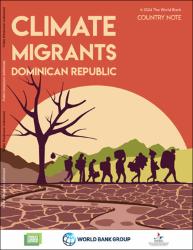/admin/item?itemID=20b7ae0f-c44e-4547-9f2c-f3ff32671862
Climate migrants : Dominican Republic : Country Report

View/
Type of Access
OpenMaterial Type
ArticleType of Content
Technical reportLanguage
EnglishCollection
- Gestión ambiental [2966]
Metadata
Show full item record| Abstract: | The Dominican Republic (DR) is vulnerable to climate change and has a high rate of natural degradation. The DR shows evidence of significant human mobility flows of (i) internal migration, mainly rural to urban; and (ii) international cross-border migration, especially from Haiti. Given this context, the DR is an important place to study migration induced by the impacts of climate change and natural degradation. In this report, climate migration refers to migration that can be attributed largely to the slow-onset impacts of climate change on livelihoods through natural degradation such as shifts in water availability, crop productivity, ecosystem productivity, or to factors such as sea-level rise. This note builds upon previous studies undertaken regarding climate migration in the DR and combines a quantitative modeling approach with a qualitative case study. |
| Author(s): | World Bank Group
|
| Date: | 2024 |
| Published: | Washington, DC: World Bank Group |
| Citation: | World Bank Group (2024). Climate migrants: Dominican Republic: Country Report. Washington, DC: World Bank Group. Recuperado de: |
| URI: | https://bvearmb.do/handle/123456789/4662
|

